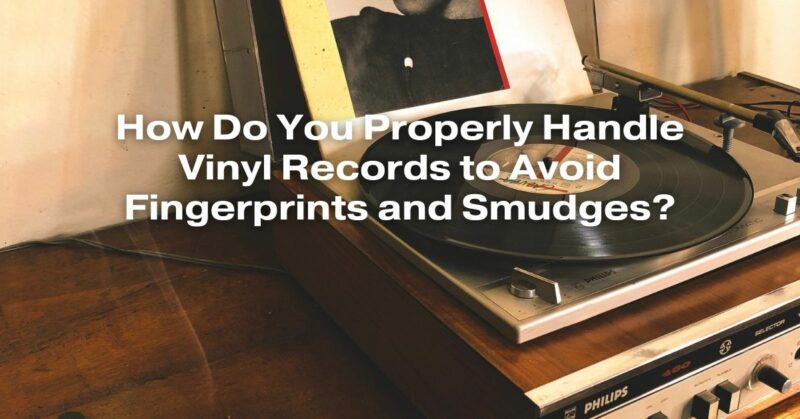Vinyl records have made a remarkable comeback in recent years, becoming the preferred choice for audiophiles and music enthusiasts who appreciate the warm, rich sound they produce. To fully enjoy the timeless charm of vinyl, proper handling and maintenance are essential. One of the most common issues faced by vinyl collectors is the presence of fingerprints and smudges on the delicate surface of these records. This article explores the reasons why avoiding fingerprints and smudges is crucial and provides comprehensive guidelines on how to handle vinyl records properly.
Why Avoid Fingerprints and Smudges?
Fingerprints and smudges might seem insignificant, but they can have a significant impact on the sound quality and longevity of your vinyl records. Here’s why it’s crucial to keep your records free from these marks:
- Sound Quality: Vinyl records work by capturing grooves that represent the audio signal. Any foreign substance on the surface, such as fingerprints or smudges, can disrupt the stylus’s ability to accurately track the grooves, leading to distortion and degraded sound quality.
- Longevity: Vinyl records are fragile and prone to wear and tear. Fingerprints contain oils and acids that can corrode the vinyl over time, leading to permanent damage. Regularly playing records with fingerprints can significantly reduce their lifespan.
- Aesthetics: Clean records not only sound better but also look better. Fingerprints and smudges can be unsightly, especially on a pristine vinyl album cover, diminishing its overall visual appeal.
Proper Handling Techniques
- Wash Your Hands: Before handling vinyl records, make sure your hands are clean and dry. Wash them thoroughly with mild soap to remove any oils and dirt.
- Handle by the Edges: Always handle vinyl records by the edges and the label in the center. Touching the grooves, even with clean hands, can leave behind fingerprints.
- Use a Cleaning Brush: Invest in a carbon fiber or velvet brush specifically designed for cleaning vinyl records. Gently run the brush along the grooves in a circular motion to remove dust and debris.
- Store Properly: When not in use, store your vinyl records vertically in a cool, dry place. Use protective inner and outer sleeves to prevent dust, fingerprints, and scratches.
- Invest in a Record Cleaning Machine: If you have an extensive vinyl collection, consider investing in a record cleaning machine. These devices use various cleaning solutions and brushes to deep clean records, ensuring they are free from fingerprints and smudges.
- Use Anti-Static Inner Sleeves: Replace standard paper sleeves with anti-static inner sleeves. These sleeves not only prevent static buildup but also reduce the risk of attracting dust and fingerprints.
- Avoid Overhandling: Minimize the frequency of handling your vinyl records. The more you touch them, the higher the chances of leaving fingerprints. Try to handle them only when necessary.
Conclusion
Properly handling vinyl records is essential to preserve their sound quality, longevity, and aesthetic appeal. By following the guidelines mentioned above, you can ensure your vinyl collection remains in pristine condition, allowing you to enjoy the authentic sound of analog music for years to come. Remember, a little care and attention go a long way in maintaining the integrity of your cherished vinyl records.


